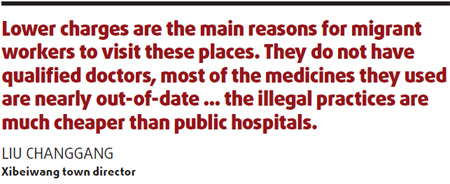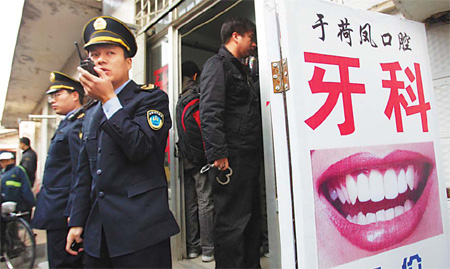Illegal clinics put patients at risk
|
Haidian district health officials raid an illegal dentist's clinic in December. CFP |
There are more than 1,200 illegal and unsafe medical clinics operating in Beijing and used mainly by migrant workers, an investigation has found.
Beijing's health supervision department found that about 42 percent of people choose to use the clinics, despite the medical facilities being unsafe.
The clinics are generally low-cost, and sometimes even allow delay payment, so they have a solid market foundation among migrant workers, the investigation found.
Li Yang, from the health supervision department, said a map of the 1,200 illegal clinics, spread across seven districts and 26 key streets and towns, was now available as a guide for patients seeking appropriate medical treatment and to help the government root out illegal operators.
In the past four years, the city has carried out a series of campaigns cracking down the illegal clinics, but illegal medical practices are still rampant, especially in areas with a floating population, such as near construction sites and rural areas.
In late September, local health authorities shut down nine illegal clinics in Xibeiwang town, Haidian district, but three have now reopened, said town director Liu Changgang.
"There are at least 60 illegal practices all over the town now," he told METRO. "The booming situation of the illegal practices in the town links with the demands of the large floating population."
"Lower charges are the main reasons for migrant workers to visit these places. They do not have qualified doctors, most of the medicines they used are nearly out-of-date and they do not pay taxes, the illegal practices are much cheaper than public hospitals," he said. The investigation report made a series of recommendations to government on dealing with illegal medical practices, such as increasing the supply of medical services to migrant areas.
"Many people only visited the illegal clinics because they want to save their money, but the quality of health care there cannot be guaranteed," said a doctor, surnamed Zhang, from Beijing Chaoyang Hospital.
"Some patients develop heavy infections after receiving inappropriate treatment in unlicensed clinics. They come to the hospital only when it is too late."
Zhang said the current public medical insurance system cannot meet the needs of patients, especially those migrant workers, and this created loopholes for unlicensed clinics to exploit.
Ma Lin, vice-director of the health supervision division under the Haidian health bureau, said: "The migrant workers should be included in the medical insurance system, so that they will not need to take the risk for a cheaper alternative. Besides, the medicine fees should be lowered. Nowadays, some medicine agents ask for a much higher price than producer price, which cannot be afforded by migrant workers."
Shi Deyang, a 43-year-old migrant worker from Jiangsu province, said he would not go to an unlicensed clinic.
"I just make about 100 yuan a day. I cannot afford to go to see a doctor if I just get a fever or flu," he said.

(China Daily 10/20/2009 page26)















